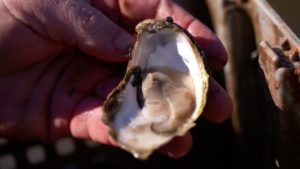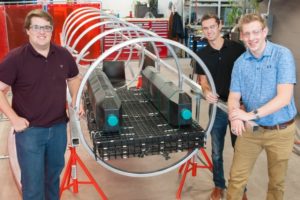UPEI students turning their class project into a business, finalizing their last prototype this spring

A group of UPEI students is gearing up to take their invention to market where it can hopefully make the process of growing oysters easier.
Third-year engineering students Jordan Sampson, Brett McDermott and Dylan MacIssac are finalizing the last prototype of their oyster trap flipping machine this spring and hope to get it to market later this year.
As part of a class project where they were paired with an industry partner to solve a problem, they came up with a device that attaches to a boat that can automate the flipping of oyster traps, a crucial step in growing oysters.
They’re now turning that project into a business called Island Aquatech. They’ve received $55,000 in funding already and will be looking for more in order to get their final prototype perfected and to start mass producing the machines.
Very labour intensive
Kenneth Arsenault, president of the P.E.I. Shellfish Association, said Island Aquatech’s machine would help speed up a very labour intensive part of oyster farming.
“All the acquacultures that I know are talking about it and are interested in it,” Arsenault said of Island Acquatech’s machine.
Island Aquatech oyster trap flipper
Brett McDermott, Jordan Samson and Dylan MacIsaac pose with Island Aquatech’s oyster flipper. (UPEI)
Right now, flipping is done manually by two or three people and the traps weigh up to 300 pounds. Oysters are grown in floating traps that need to be flipped about every two weeks to air dry the oysters to prevent fouling from building up, to kill off bacteria and to make a better oyster in the growing stages.
The students, who all grew up on P.E.I., have built a full-scale prototype of their machine that would automate the process of flipping the traps. They are finalizing minor modifications to the design before getting it to market potentially this summer, McDermott said.

“Our design is capable of functioning with only one guy driving the boat, so you don’t need a guy standing in the water doing the labour intensive work,” Sampson said.
Other people have tried to make similar machines, but they are too costly for many growers. Island Aquatech’s machine uses the forward motion of the boat rather than hydraulics, which lowers the cost of it.
“I’ll definitely be looking for one,” Arsenault said. “It’s very labour intensive to flip them by hand … it takes two guys to flip them and some people have thousands of them.”
Business training
The co-founders are also enrolled in the Creative Destruction Lab, a business training course in Halifax, where they’ve learned about how to start and operate a business. They hope to start getting their machine to growers in P.E.I., then expand to the rest of the Maritimes and eventually the entire country.
“They offer mentorship for business and they’re really helping us get to market,” Sampson said.
The machine would eliminate a job but that won’t affect the industry because it’s such an infrequent task, according to Arsenault.
“Right now it takes three people by hand, with the machine it would only take two,” Arsenault said. “Labour is hard to find because it’s only part-time work every two weeks.”


